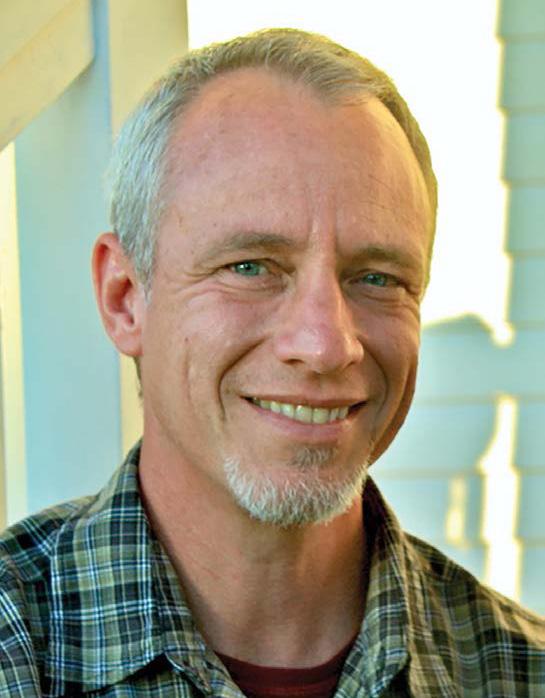
4 minute read
Let Go to Grow
By Michael V. Pollock, Executive Director of Interaction International
Returning to Vermont, USA, from Rift Valley Academy, Kenya, at age twelve, I thought I was used to releasing my past. By age eight I had lived on Long Island (New York), in suburban New Jersey, and in rural Vermont before moving to East Africa. But arriving back to a new town in Vermont, I discovered internal resistance. My Kenyan and international friends, the charcoal fires and flowering jacaranda trees, the red clay soil, the Kikuyu farms and churches had gotten deep under my skin. How could I give all that up?
Advertisement
Honestly, there was not much choice except to accept it or not. I bonded with a few other TCKs in our high school of 1,200, but three friends don’t make a robust social life and we didn’t even have the TCK moniker to slap on ourselves yet. In the 1980s it was challenging to stay in touch with my friends in Kenya, but I persevered, waiting a month or more between letters sent and received. Meanwhile, I tried to open my hands and heart to my new community. I found there is more to my Michael-ness than my missionary-kid experience: I played soccer and tennis and led those teams, enjoyed academics (except math and chemistry), and adventured into winter camping and long-distance biking. By letting go a bit of my “Kenya MK” identity, I was able to expand as a person.
By the time I left home for Houghton College (alma mater of pandemic expert Dr. Deborah Birx) in 1986, my father’s name was becoming well known in the third-culture community. When he accepted a position at Houghton College directing Interaction International, I lost my Vermont “hometown,” and when my two brothers transferred to Houghton as well, I released my dream of anonymity and starting fresh.

Once again, there wasn’t much choice but to accept the things I could not change, but I would be untruthful if I said the process wasn’t painful and grief-filled; however, it was also full of new potential. I gained much besides a degree in Education with International Studies; more life-long friends were made, including the woman who became my wife. Releasing my Vermont “home” brought expansion once again.
Ten years, two children, three school postings, and four addresses later, our small family—then in Baltimore, Maryland—had a choice in front of us. We felt a sense of calling to overseas work and began exploring opportunities in regions we knew somewhat (East and West Africa) and teaching positions in a region we knew next to nothing about: Asia. In Africa, we had many connections and the Pollock name was now even more broadly known. In Asia, we knew a small handful of people and would be more anonymous. Previous experience had shown us that in order to expand our experience, our hearts, and our life, we needed to release some control, recognition, and comfort. The process took us two years—releasing is not easy.
Thus it was (simplified of course, for purposes of brevity) that four of us arrived in Tianjin, China, in July of 2003 as the SARS outbreak was winding down there. Welcome to TJ: a flood-plain city of 11 million, heat and smog and people everywhere, open-air markets, scores of new-to-us fruits and vegetables, spiced lamb on sticks roasting over open coal fires, jiaozi (dumplings), Korean restaurants, ancient architecture, rich culture, a new language, and welcoming Chinese and international friends! Without the release—without the exchange of this for that, without the “yes” to one story and the “no” to other possibilities—our experience would not have expanded and our life would have been more narrow.
And just to ice the cake, in choosing the broadening path of life in China, we had no idea that the father of our new mentor family, Philip Workman, grew up attending Rift Valley Academy in Kenya, or that another school principal in our system had invited my father, David, to come and speak to our schools the following spring. Go ahead, feel that forehead slap.
Today, the world is at an intersection of vital conversations and decisions on integrity, justice, and the impact of race, gender, class, nationality, and ethnicity on power. A false dichotomy mindset tells us we should conserve what we have, clutching tightly to the comfortable, to what is working for me, right now. Alternatively, some propose we scrap it all, unmoor ourselves, and begin again. Imagine what could be if we hold fast to what is good and press on towards what needs to be radically changed for the thriving of human beings, for every person, in every place. If we are humble enough to examine and release our prejudices, our geography and sociology of pre-set ideas, we might find vast landscapes of insight, understanding, and growth.
This is the dual lesson I’ve taken to heart: don’t be afraid to release, for in releasing we often find growth and enlargement. And nothing good is ever fully lost. In the intersections of old and new, unknown and known, there is great joy.


Author: Michael Pollock



